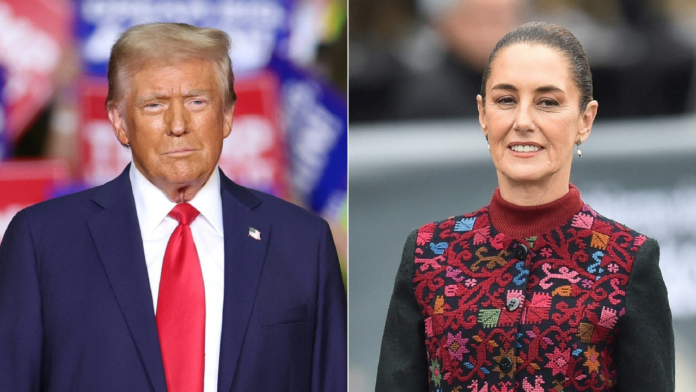Mexican President Claudia Sheinbaum said on Wednesday Mexico would retaliate if the U.S. President-elect Donald Trump followed through with his proposed 25% across-the-board tariff, a move her government warned could kill 400,000 U.S. jobs and drive up prices for U.S. consumers, according to Reuters.
“If there are U.S. tariffs, Mexico would also raise tariffs,” Sheinbaum said during a press conference, in her clearest statement yet that the country was preparing possible retaliatory trade measures against its top trade partner. Mexican Economy Minister Marcelo Ebrard, speaking alongside Sheinbaum, called for more regional cooperation and integration instead of a war of retaliatory import taxes.
“It’s a shot in the foot,” Ebrard said of Trump’s proposed tariffs, which appear to violate the USMCA trade deal between Mexico, Canada and the U.S. Ebrard warned the tariffs would lead to massive U.S. job losses, lower growth and hit U.S. companies producing in Mexico by effectively doubling the taxes they paid. “The impact on companies is huge,” he said.
The proposed tariffs would hit the automotive sector’s top cross-border exporters especially hard, Ebrard added, namely Ford, General Motors and Stellantis. Ebrard noted that 88% of pickup trucks sold in the U.S. are made in Mexico and would see a price increase. These vehicles are popular in rural areas that overwhelmingly voted for Trump. “Our estimate is that the average price of these vehicles will increase by $3,000,” Ebrard said.
According to Reuters, Sheinbaum and Trump spoke by phone later on Wednesday, with the two discussing topics at the top of Trump’s agenda. Trump had said the tariffs would remain in effect until the flow of drugs—particularly fentanyl—and migrants into the U.S. was controlled. In a post on his Truth Social platform, Trump said Sheinbaum “agreed to stop migration through Mexico, and into the United States, effectively closing our Southern Border.” He described the conversation as “very productive.”
Sheinbaum later responded on X that she had laid out Mexico’s migration strategy, which “attended to” migrants before they arrived at the U.S.-Mexico border, in her call with Trump. “Mexico’s stance is not to close borders, but to build bridges between governments and their peoples,” she added.
In after-hours trading on Wednesday, Mexico’s peso strengthened by as much as nearly 1% against the dollar, reversing losses logged in previous days. Many analysts regard Trump’s tariff threats as more of a negotiating tactic than trade policy.
“The lack of a clear link between this threat and questions related to trade suggests the new president plans to use tariffs as a negotiating strategy to achieve goals largely unrelated to trade,” said David Kohl, chief economist at Julius Baer.



